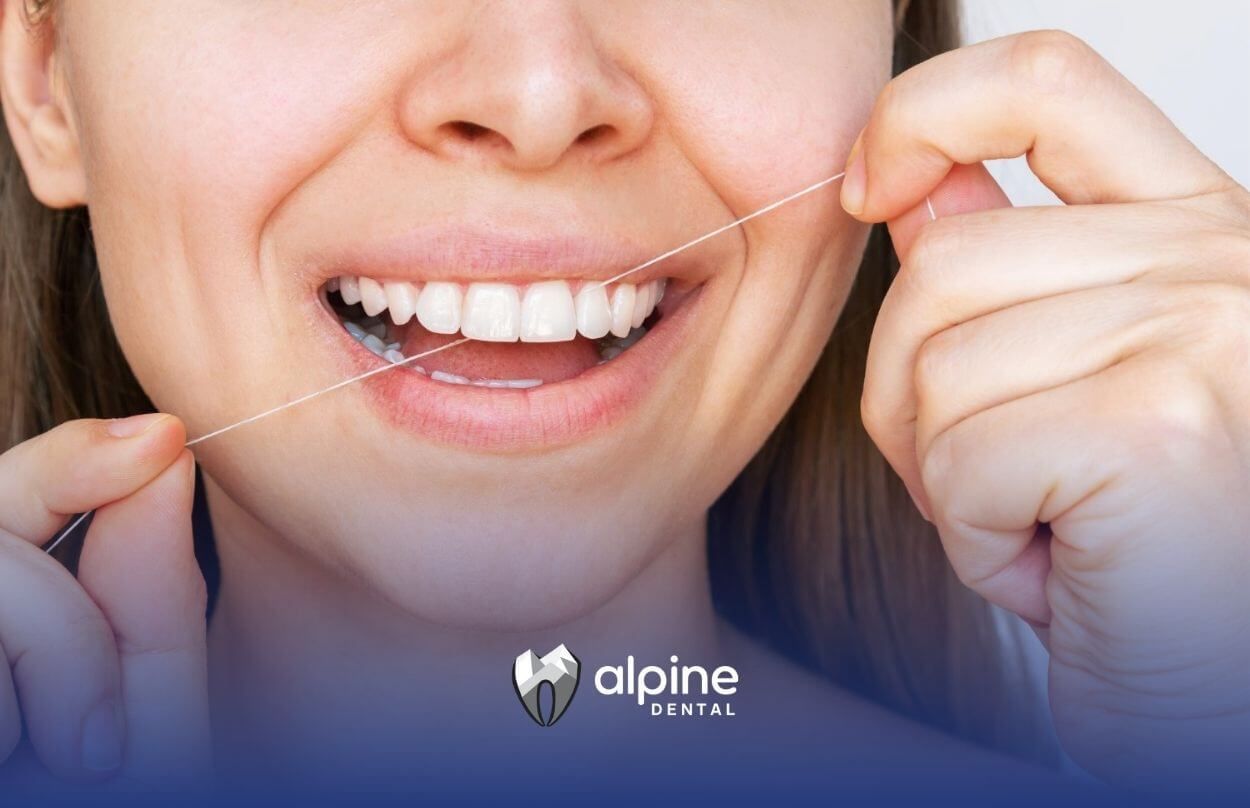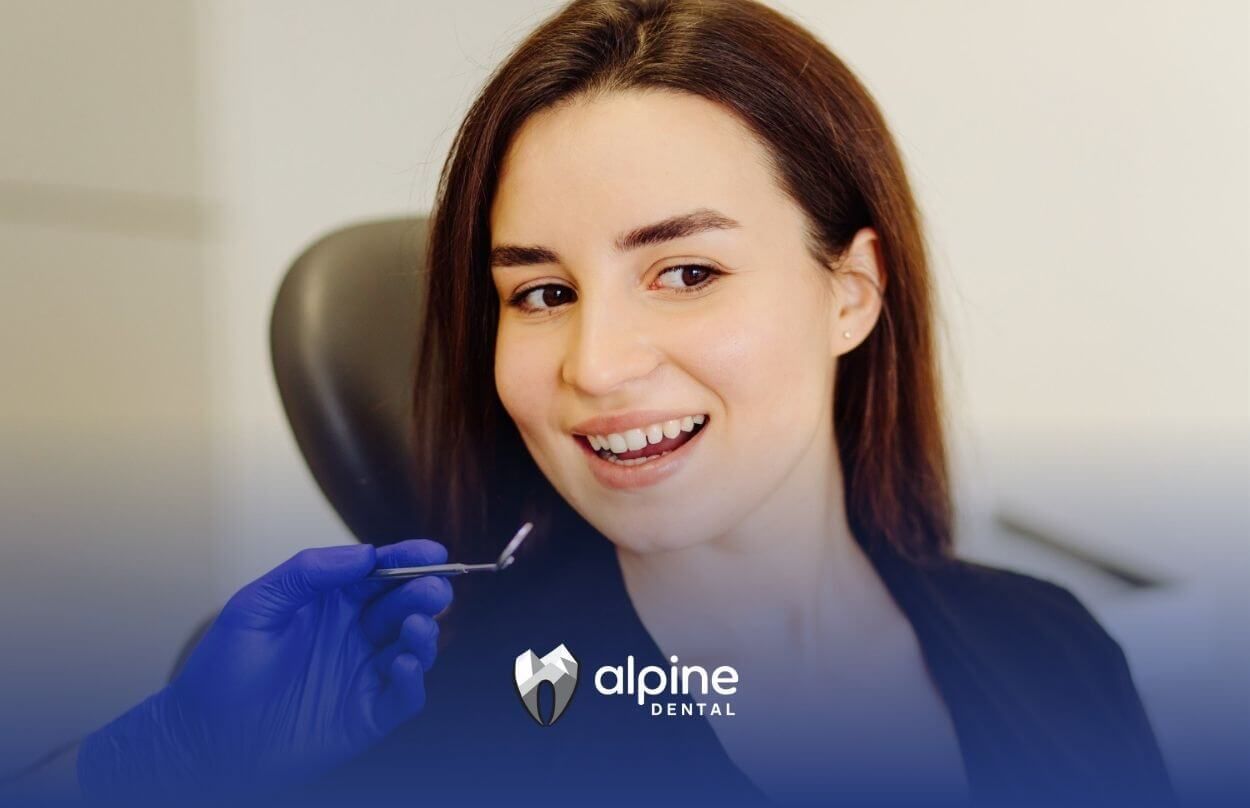How Does Teeth Whitening Work? Dentist vs. At-Home, Costs, and Results Explained
A sparkling white smile is often seen as a sign of health and confidence. But with so many whitening products and treatments available, it’s natural to wonder, how does teeth whitening work?
This comprehensive guide breaks down the science behind teeth whitening, the different methods available (from in-office to at-home), what you can expect during the process, and how to maximize your results safely.
Whether you’re considering professional whitening at a dental office, laser teeth whitening, or teeth whitening at home, understanding the process, costs, and potential side effects will help you make the best choice for your smile. Read on to discover how teeth whitening works-and how Alpine Dental can help you achieve your brightest smile yet.
How Does Teeth Whitening Work? The Science Explained
The Structure of Your Teeth
To understand how teeth whitening works, it helps to know a bit about tooth anatomy. Your teeth are made up of:
- Enamel: The hard, outer layer that protects your teeth.
- Dentin: The softer, yellowish layer beneath the enamel.
- Pulp: The innermost part containing nerves and blood vessels.
Stains can be either:
- Extrinsic: On the surface of the enamel, caused by foods, drinks, or smoking.
- Intrinsic: Deeper stains within the dentin, often from aging, trauma, or medication.
The Whitening Chemistry
Most teeth whitening products use peroxide-based agents (hydrogen peroxide or carbamide peroxide). These chemicals break down into oxygen molecules that penetrate the enamel and react with the colored molecules, causing stains. The chemical reaction breaks these stain molecules apart, making them less visible and resulting in a whiter appearance.
The Teeth Whitening Process at Dentist Offices
Professional teeth whitening at the dentist is the most effective and safest way to achieve significant whitening quickly. Here’s what you can expect during a typical in-office whitening session:
Step 1: Consultation and Evaluation
- The dentist examines your teeth and gums to ensure you’re a good candidate.
- They check for sensitivity, existing dental work, or oral health issues.
Step 2: Professional Cleaning
- A thorough cleaning removes plaque and tartar, allowing the whitening gel to work more effectively.
Step 3: Shade Selection
- The dentist determines your current tooth shade and discusses your whitening goals.
Step 4: Gum Protection
- A cheek retractor exposes your teeth.
- A protective resin or gel is applied to your gums to prevent irritation.
Step 5: Application of Whitening Gel
- The dentist applies a concentrated peroxide-based gel to your teeth.
- The gel is left on for 15–30 minutes, sometimes reapplied for multiple sessions.
Step 6: Light or Laser Activation (Optional)
- Some treatments use a special light or laser to activate the gel and speed up the whitening process (known as laser teeth whitening).
- The laser heats and activates the bleaching agent, enhancing stain removal and providing faster results.
Step 7: Rinse and Reveal
- The gel and protective materials are removed.
Immediate results are visible, though final results may appear after a day or two.
Laser Teeth Whitening
Laser teeth whitening is a specialized in-office procedure. The process is similar to standard whitening but uses a laser to activate the bleaching gel, often resulting in more dramatic results in less time3. The procedure typically takes 30–60 minutes, and you can see your teeth become several shades whiter in a single visit.
Teeth Whitening at the Dentist Cost: What to Expect
The cost of teeth whitening at the dentist varies depending on the method and your location. Here’s a general breakdown.
| Whitening Treatment | Average Cost | Cost Range |
|---|---|---|
| Dental whitening by laser | $792 | $611 – $1,368 |
| In-office whitening | $583 | $463 – $1,011 |
| Dentist-provided take-home kits | $375 – $500 | |
| Over-the-counter products | $25 and up |
Professional whitening is more expensive than at-home options, but it offers faster, more reliable results and is supervised by a dental professional for safety.
Teeth Whitening at Home: Options and Effectiveness
At-home teeth whitening is popular for convenience and affordability. Common options include:
- Whitening Strips: Flexible plastic strips coated with peroxide gel. Worn daily for 1–2 weeks.
- Whitening Trays: Pre-filled or custom trays with whitening gel, worn for a set period each day.
- Whitening Toothpastes: Contain mild abrasives and low concentrations of peroxide.
- Paint-On Gels: Applied directly to teeth with a brush.
How does teeth whitening work at home? The active ingredient (usually hydrogen peroxide) penetrates the enamel to break down stains, just like in professional treatments, but at lower concentrations. Results are gradual and may take several weeks.
Safety and Precautions for At-Home Whitening
- Always follow instructions carefully.
- Overuse can lead to tooth sensitivity or gum irritation.
- Not all stains respond to at-home whitening; deep or intrinsic stains may require professional treatment.
Does Teeth Whitening Damage Enamel?
One of the most common concerns is, does teeth whitening damage enamel? When used as directed, both professional and reputable at-home whitening products are considered safe for tooth enamel. Tooth enamel is the hardest substance in the body, but it can be affected by overuse or misuse of whitening products.
How to Protect Your Enamel
- Use whitening products as directed.
- Avoid abrasive whitening products that can scratch enamel.
- Consult your dentist before starting any whitening regimen, especially if you have sensitive teeth or dental restorations.
Teeth Whitening Side Effects: What You Need to Know
Teeth whitening is generally safe, but some people may experience side effects, including:
- Tooth Sensitivity: Temporary sensitivity to hot or cold is common. This usually resolves within a few days.
- Gum Irritation: Whitening gels can irritate gums if they come in contact with soft tissue.
- Uneven Results: Teeth with fillings, crowns, or veneers may not whiten like natural teeth.
- Enamel Changes: Rarely, overuse can lead to enamel roughness or an increased risk of decay.
Stop treatment and consult your dentist if you experience persistent pain or sensitivity.
How Long Does Whitening Last on Teeth?
Teeth whitening is not permanent. Depending on your oral hygiene, diet, and lifestyle habits, results can last from a few months to three years. Smoking, drinking coffee, tea, or red wine can stain teeth more quickly and shorten the effects of whitening.
Tips to Prolong Whitening Results
- Practice good oral hygiene (brush and floss daily).
- Avoid foods and drinks that stain.
- Schedule regular dental cleanings.
- Use whitening toothpaste as maintenance.
Comparing Teeth Whitening Options
In-Office Whitening
- Fast, dramatic results under dentist supervision
- Safe and effective for most stains
- Professional cleaning and gum protection included
- Limitations: Higher cost, possible short-term sensitivity
Laser Teeth Whitening
- Fastest and most effective option
- Uses laser to activate whitening gel for enhanced results
- Ideal for deep or stubborn stains
- Limitations: Most expensive, may cause short-term sensitivity
Dentist Take-Home Trays
- Custom-fit trays for even whitening
- Professional-grade gel, safe for enamel
- Convenient to use at home
- Limitations: Slower than in-office, requires daily use for 1–2 weeks
Whitening Strips
- Affordable and easy to use
- Available over-the-counter
- Gradual results over 1–2 weeks
- Limitations: Less dramatic results, possible gum irritation
Whitening Toothpaste
- Maintains whitening results
- Easy for daily use, low cost
- Removes surface stains with mild abrasives
- Limitations: Minimal whitening, not effective for deep stains
How Alpine Dental Can Help: Personalized Whitening for Every Smile
At Alpine Dental in Jackson and Lakewood, NJ, we offer a full range of teeth whitening solutions to fit your needs and budget:
- Professional In-Office Whitening: Get dramatic results in just one visit, with expert supervision and safety.
- Laser Teeth Whitening: Achieve a brighter smile in under an hour with our advanced laser technology.
- Custom Take-Home Kits: Enjoy professional-grade whitening at your own pace, with custom trays for a perfect fit.
- Comprehensive Consultation: We assess your oral health and recommend the safest, most effective option for your unique smile.
- Gentle Approach: Our team prioritizes your comfort, minimizing sensitivity and maximizing results.
- Ongoing Support: We provide tips and products to help you maintain your sparkling smile for the long term.
Ready to transform your smile? Alpine Dental combines expertise, technology, and personalized care for the best whitening experience in Ocean County.
Conclusion: Ready for Your Brighter, More Confident Smile?
Now that you know how does teeth whitening works, from the science to the process, costs, and side effects, you can make an informed decision about the best way to achieve the smile you’ve always wanted. Whether you’re interested in in-office laser teeth whitening or custom take-home trays or want expert advice on teeth whitening at home, Alpine Dental is here to help.
Take the first step toward a whiter, more radiant smile. Contact Alpine Dental today and let us design a whitening plan that fits your lifestyle, budget, and goals. Your new smile is just one visit away-let’s make it unforgettable!
Frequently Asked Questions (FAQs)
Does teeth whitening actually work?
Yes, teeth whitening works by using peroxide-based gels to break down stains on and inside the enamel, making teeth appear whiter. Professional treatments are more effective and faster than at-home options.
Can yellow teeth really be whitened?
Yes, yellow teeth caused by surface stains respond well to whitening. Deeper, intrinsic stains may require professional treatments for best results.
Is teeth whitening painful?
Most people experience little to no pain. Temporary sensitivity or mild gum irritation is possible, especially with strong gels or laser whitening, but these effects usually fade quickly.
Sources:
- https://www.nhs.uk/conditions/teeth-whitening/
- https://www.cdhp.org/can-you-whiten-teeth-that-have-been-yellow-for-years/
- https://www.healthline.com/health/how-does-teeth-whitening-work
- https://www.teethtalkgirl.com/dental-health/teeth-whitening-at-the-dentist-procedure-cost/
- https://www.healthline.com/health/how-long-does-teeth-whitening-last




